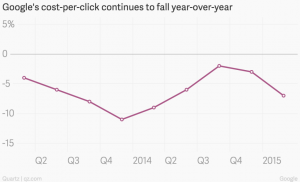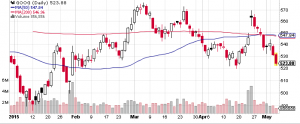 What next for Google?
What next for Google?
In 1996 Larry Page and Sergey Brin began a search engine called BackRub and operated the site on the servers of Stanford University for over a year. The next year the duo registered the web domain Google.com, a play on the mathematical term “googol” which is represented by the numeral 1 followed by 100 zeros, a homage to the amount of information on the web. Fast forward to today and Google may have surpassed the reach originally identified in its clever name, becoming the largest search engine in the world and continuing to grow. So what is on the horizon for this ever-expanding company, and what factors will determine the growth of its stock?
Looking to the past to predict the future
The company’s most recent earnings report in late April resulted in a small miss on both revenue and EPS numbers as compared to analysts’ estimates. However, revenue was up year-over-year 12% and investors were not deterred by the slight miss in numbers as the stock traded up 4% on the day of reporting. The company claimed that one large reason for the miss in expected revenue was due to a market in which the strong US dollar negatively affected currency exchange rates. Missing on analysts’ estimates is nothing new for the company, as it has missed in seven of the last nine quarters on EPS estimates, and investors do not seem deterred.
Mobile is the future
Everyone can see the trend towards mobile advertising as being the biggest growth area for advertisers, which is why it is interesting that Google has been very quiet about their mobile advertising business. The company currently has a 90% share in the mobile search industry, but it is unclear if they are losing ground to competitors in the mobile arena.
 Ads, ads, ads
Ads, ads, ads
Advertising is the lifeblood of any search engine company, and Google is no exception. That is why it is troubling that the company’s cost-per-click continues to disappoint by dropping steadily each year. However, this may not tell the whole story, as YouTube cost-per-click rates have dragged down the entire company. Discounting YouTube’s role, CPC across Google would actually be growing year-over-year steadily.
Google’s main competitors;
- Amazon
- Bing
- Yahoo
To the average consumer, Google might seem like such a behemoth in search and advertising that no other company can come close to their capabilities. However, firms like Facebook and Amazon are already eating away at the profits in advertising areas. Facebook has gained significant ground in online video advertising, and their share of global ad revenue has increased to being right behind Google’s. Additionally, Facebook recently opened up its mobile advertising platform which was originally only available to app publishers to all advertisers wishing to target users across multiple devices
Google is well aware of Amazon as the biggest potential competitor in the long-term. Google’s Executive Chairman Eric Schmidt is on the record as saying, “Many people think our main competition is Bing or Yahoo, but, really, our biggest search competitor is Amazon.” In many ways Google could be seen as a middle-man, and left out in the cold when consumers are simply searching for the sake of purchasing on the e-commerce platform, and although the companies certainly have different visions, Amazon provides a challenge for Google to overcome if they want to stay at the top.
European regulators putting on the squeeze
Europe is not appreciative of the business operations of Google, charging the company with anti-trust practices by favouring its own web properties in search results over its rivals. The EU accused Google of directing e-commerce consumers away from rivals such as Yelp and towards their own sites to the detriment of the visitor. The impact of these allegations may have a ripple effect. Not only will Google most likely be forced to change its search algorithms and tactics, but these anti-trust accusations could filter down to other aspects of their business operations. Even though the US did not label Google a monopoly, they still found the company guilty of abusing monopoly-like powers to influence consumers.
Targeting takeovers?
Recent rumours have spread that Google may be looking in to buying social media powerhouse Twitter. It is no surprise that Google has been looking to beef up its social media presence, and buying Twitter would have a major immediate impact. Twitter has even recently opened up some of its advertising to Google, where advertisers will now be able to buy sponsored tweets through Google’s ad exchange. The deal does not seem implausible either. Twitter has had trouble growing its user-base and could benefit from the massive reach of Google, while the search engine giant would get a boost to its social media endeavours.
 Current valuation
Current valuation
Google currently trades at a around 25 times current earnings, which compared to previously mentioned competitors Facebook [FB] and Amazon [AMZN] (who has yet to even turn any profit for shareholders), is quite cheap. They are also the industry behemoth, with a market cap over $350b and growing. Taking a look at a year-to-date chart of the stock (right), it seems to be trading in a channel in between $500 and $570 over the past several months, with the channel pointing in an upward trend, however the upper end of that range begins to approach its 52-week high close to $600. As it stands, trades are coming a fair amount below the 50 and 200 day moving averages, a possible indication of the stock being undervalued.
Bottom Line
Google isn’t going anywhere, and may continue to expand its reach even further than it already has. The most recent quarter of missed earnings don’t seem too concerning, and may have only been a result of an extremely strong US dollar. However, it faces tough competition from the likes of Amazon and Facebook who are attempting to take market share and carve out their own piece of the pie, and from regulators who don’t appreciate their stealthy attempts to sway consumer activity to their advantage. The current stock price is certainly not overvalued and may have room to run in the coming year. However, if regulation and competition concerns are not settled, we may see Google continue to trade in this range in the near future.
Trade Google at 24Option.
